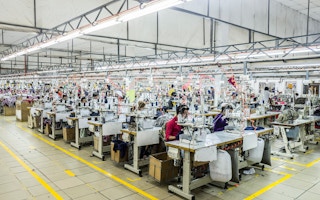“Protecting the environment goes hand-in-hand with protecting the rights of those who defend it,” said Michele Bachelet, UN High Commissioner on Human Rights, last month.
Human rights defenders are vital leaders of a just transition to green economies. They are on the front lines of the climate crisis – and they hold essential information on the risks and harms associated with business actions, which can be used by companies and investors to conduct effective environmental and human rights due diligence to create long-term value.
Yet, these defenders are under sustained attack. In 2021, there were at least 615 attacks against people raising concerns about business-related harms, with nearly 70 per cent of attacks against climate, land and environmental rights defenders. Since January 2015, we have documented more than 3,870 attacks globally, including killings, death threats, arbitrary detention and strategic lawsuits against public participation.
Indigenous peoples, who are at the forefront of protecting biodiversity and our shared planet, experience a disproportionately high level of attacks. Although they comprise approximately 5 per cent of the world’s population, they faced 18 per cent of attacks globally in 2021.
One of the main drivers of this violence is the failure of companies and investors to engage in safe and legitimate consultation with rights-holders and defenders. This failure stands to derail the fast transition to a zero-carbon economy that we urgently need.
If companies and investors do not listen to people highlighting risks related to their operations, investments, supply chains, and business relationships, or if it is not safe to raise these concerns, they will lose out on critical information needed to mitigate harm and achieving a fast and fair energy transition, essential for averting the climate crisis.
Renewable energy firms guilty too
While companies and investors are increasingly making welcome and necessary commitments to climate action, including promises to achieve net zero by mid-century, many do not have policies expressing zero-tolerance against reprisals, nor do they assess risks to defenders or engage in consultation with them.
That’s the case even in the sector most crucial to the transition: our 2021 Renewable Energy Benchmark, we found that of the 15 of the largest global renewable energy companies evaluated, all scored zero on their commitment to respect the rights of human rights and environmental defenders.
“
The urgently needed global transition to green economies will only be successful if it is sustainable and just. This means respecting the rights of the people at the forefront of protecting our earth and raising the alarm about harmful business practices.
We have seen this failure to secure consent from affected communities prior to starting development projects lead to horrific outcomes. On 30 December 2021, police officers in the Philippines raided an Indigenous village, killing nine leaders. Local groups said that those killed were targeted and red-tagged because of their opposition to the Jalaur Mega Dam construction. Indigenous groups had challenged the project for years saying it would destroy their ancestral domain.
Meanwhile, in Mexico, an Indigenous Zapotec community has been raising concerns about wind farm construction not respecting their rights to self-determination and free, prior, and informed consent. Leaders have faced stigmatisation and harassment. In October 2018, a federal court in Mexico delivered a historic ruling in favour of the community, ordering the Mexican authorities to carry out a consultation at a wind farm operated by a state-owned company based in Europe. In October 2020, the community filed a civil lawsuit in Paris against the company.
Provide data, denounce attacks
Engaging with rights-holders and defenders early on is one of the most effective ways of identifying actual and potential human rights and environmental impacts, while also reducing business risks. It is also their responsibility under the United Nations Guiding Principles on Business and Human Rights.
Companies and investors establishing relationships with international NGOs is not enough. Rights-holders and defenders are experts on their communities, resources, and contexts and without their insights, company and investor risk assessments are incomplete.
For human rights due diligence processes to be effective, companies and investors can start by making clear they will not tolerate any attacks to defenders related to their operations, value chains or investments, communicating this publicly and to their suppliers and business partners. Companies should also conduct due diligence across their entire value chains, as the biggest risks and harms to people and planet occur in the lower tiers.
Throughout the entire due diligence process, companies should engage in ongoing consultation with rights-holders and defenders, including prior to and at every stage of business activity, and integrate their input into decision-making.
This includes providing access to information to potentially affected communities and defenders and putting non-retaliation measures in place, such as confidential treatment of complaints and strong security protocols for handling data related to defenders. It also means respecting Indigenous communities’ land rights and right to free, prior, and informed consent. If consent is not given, the project should not proceed. This is also good business in the long run as it will avoid potential financial, reputational and legal risks.
Effective due diligence also involves conducting human rights and environmental impact assessments. The assessments should map potentially affected rights-holders and land and resource conflicts and by informed by rights-holders and defenders’ expertise
This is not just nice to do. Conducting safe and legitimate human rights and environmental due diligence benefits everyone and will ensure companies are more effectively achieving their climate commitments. As the UN Working Group on Business and Human Rights says, defenders need to be seen as key partners who can help businesses identify their human rights impacts, rather than being seen as obstacles to be disposed of.
The urgently needed global transition to green economies will only be successful if it is sustainable and just. This means respecting the rights of the people at the forefront of protecting our earth and raising the alarm about harmful business practices.
Christen Dobson is senior programme manager and researcher at UK-based non-profit Business & Human Rights Resource Centre. She co-leads the civic freedoms and human rights defenders team. Ana Zbona is the programme manager for business, civic freedoms and human rights defenders at the Business & Human Rights Resource Centre. Andrea M. Pelliconi is research assistant at the civic freedoms and human rights defenders programme at the Business & Human Rights Resource Centre.












